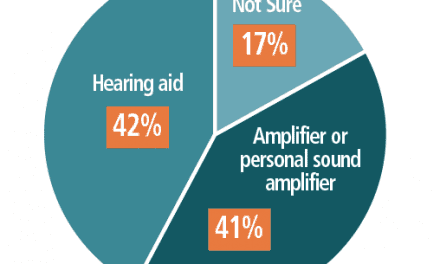Fifty years after the iconic “Three Days of Peace and Music,” a just-released survey by The Harris Poll, commissioned by Oticon, Inc, suggests that members of the Woodstock Generation may be experiencing unintended consequences of their love of hard-charging, culture-changing rock n’ roll. According to the online survey of more than 1,000 US adults ages 65-80 conducted in June, the prevalence of hearing loss among those who listened to loud music when they were young (ie, in their teens and 20s) is 40% greater than the percentage of hearing loss indicated in studies of older Americans that don’t include questions about music listening habits, Oticon announced.
That fact, and many more revealed in The Harris Poll survey, are at the core of Oticon’s nationwide media blitz to alert adults and young people to the importance of hearing health for maintaining lifelong quality of life. Timed to coincide with Woodstock celebrations across the country, Oticon has launched a targeted media campaign that includes media interviews by Oticon audiologists and a network of hearing care professionals in local markets, press releases, social media posts, and a colorful infographic, all to drive home the risks of noise and age-related hearing loss and the need for regular hearing health checks.
Then and Now Hearing Health Matters
“We recognized a unique opportunity to tap into consumer and media excitement around the 50thanniversary of Woodstock to promote a hearing health message that would resonate with people of all ages, especially music lovers,” said Gary Rosenblum, President of Oticon, Inc. “The survey results allow us to demonstrate the far-reaching consequences of loud music listening on hearing health. Fifty years ago, many believed that turning up the volume and seeking out concerts with the biggest speakers contributed to music enjoyment. Today, we know the long-term effects of noise on hearing health and the importance of protecting hearing to maintain not only the ability to enjoy music and conversation but overall quality of life.”
The Harris Poll survey questioned the Woodstock Generation about their listening habits in their youth and their ability to hear and enjoy music now. The survey found that 47% of the Woodstock Generation who listened to loud or very loud music when they were in their teens and 20s now report hearing loss. As a result, many of the Woodstock Generation (41%) say they are unable to enjoy music as they once did. The negative impact of hearing loss on their ability to participate in social activities/gatherings, at least a little, was reported by 41% of those adults with hearing loss, and 38% say their hearing loss affects relationships with family or friends, at least a little. Approximately 52% state that, at least sometimes, they have difficulty understanding what is being said in loud environments like busy restaurants.
From “Survey Says” to Call to Action
One survey finding provides an opportunity to communicate a powerful call to action about hearing healthcare.
Despite hearing challenges, the study found that many members of the Woodstock Generation have not taken steps to address their hearing loss. The majority of these adults (70%) have never seen a hearing care professional specifically about their hearing. Only around one in 10 (12%) have used hearing aids either currently or in the past.
“Helping consumers to understand that addressing hearing loss will allow them to not just enjoy music again but live fuller, more social lives is a central goal of our media outreach,” said Rosenblum. “The ability of today’s high-performance hearing aids, like Oticon Opn S, to provide wearers with access to a full range of sounds, and the possibility of again enjoying a richer, more authentic music experience, is a meaningful benefit not just to the Woodstock Generation but to all people who experience hearing loss.”
To learn more about the Harris Poll survey and to download the infographic, visit: www.oticon.com/woodstock.
Research Methodology
This survey was conducted online within the US by The Harris Poll between June 5 and June 12, 2019 on behalf of Oticon among 1,006 US adults age 65-80 (“Woodstock Generation”) including 437 older adults with hearing loss. Data were statistically weighted where necessary by age, sex, education, race/ethnicity, region, income, household size, marital status, and employment status to bring them into line with their actual proportions in the population.
Source: Oticon, The Harris Poll
Image: Oticon




